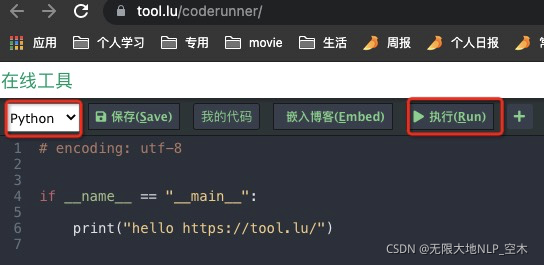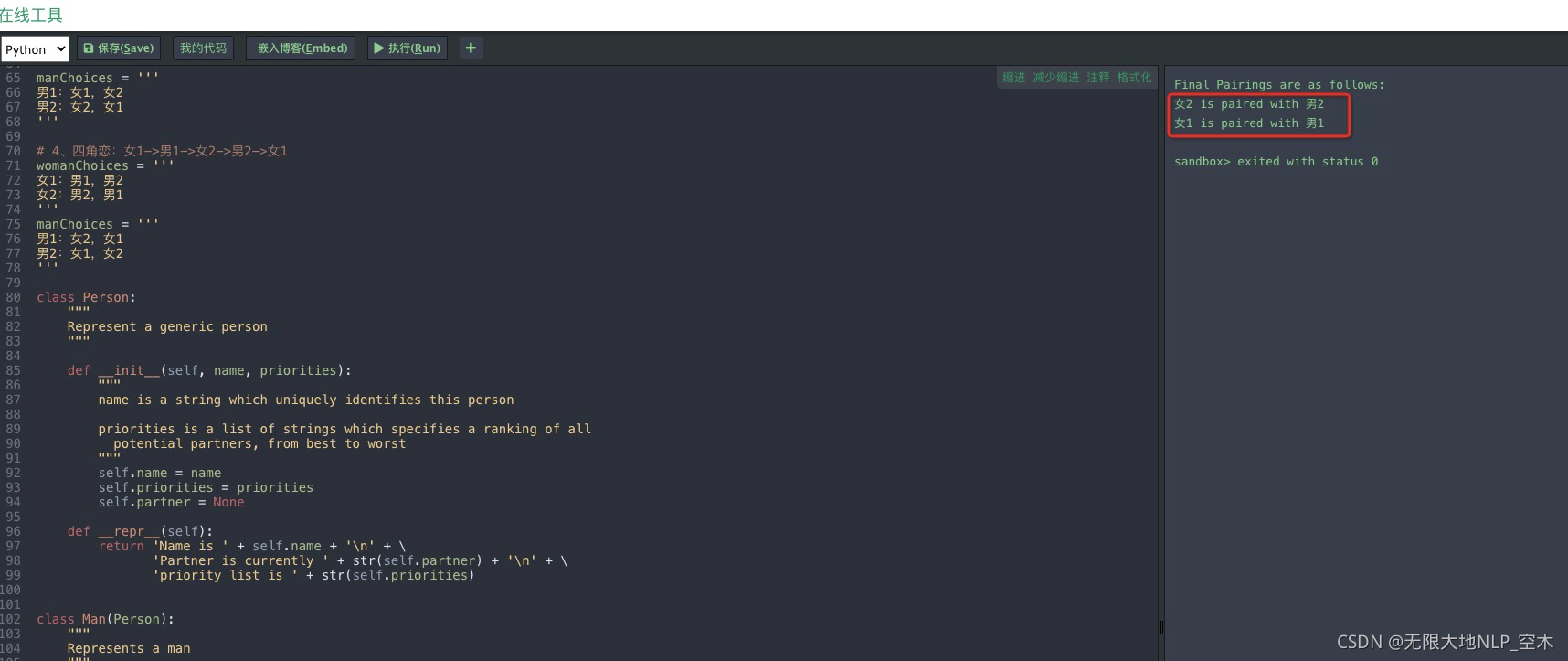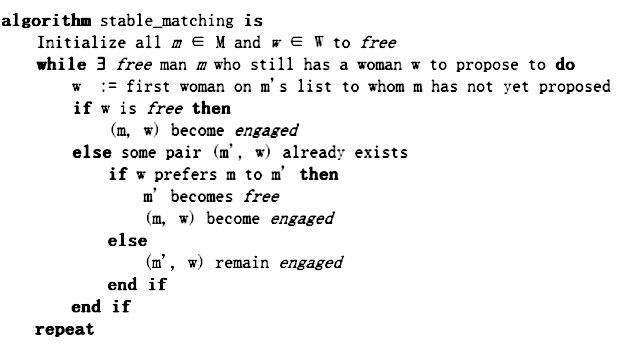时间:20210928
背景:有个相亲活动,需要暗地里给男女进行匹配,毕竟明面上直接说不喜欢哪个异性总是尴尬的。匹配的话,方法众多,并不能让每个人都满意,根据各自的意向,总能计算整体意向都不错的。
太长了不看,直接操作:
线下让N对男女:
- 写个小纸条,各自给N个异性排序,更喜欢的排在前面
- 得到:
- 女生的选择:womanChoices
- 女1:男2,男5,男1,....
- 女2:...
- ...
- 女N:...
- 男生的选择:manChoices
- 同理
- 女生的选择:womanChoices
操作:
- 进入网站:代码在线运行 - 在线工具
- 选择python
- 不要用python3
- 代码复制进去
- 修改代码里的两个变量:womanChoices、manChoices
- 将之前线下统计得到的,放在对应位置

- 点击“执行Run”
- 右侧出结果即可


算法:GS算法(盖尔-沙普利算法(Gale-Shapley algorithm))
算法思想:略
算法伪代码:

样例解释:
1、1对男女,不考虑
2、两对男女,分别优秀男1、一般男2;优秀女1、一般女2(“优秀”、“普通”方便理解,换成“青菜”、“萝卜”一个意思)
1.0、优秀女、男互相看中,普通女、男互相看中
- 女1喜欢:男1>男2
- 女2喜欢:男2>男1
- 男1喜欢:女1>女2
- 男2喜欢:女2>女1
- 结果:男1——女1、男2——女2分别匹配
- 解释:萝卜青菜各有所爱,分别各自找到自己最中意的
2.1.1、两女争优秀男,两男争优秀女
- 女1喜欢:男1>男2
- 女2喜欢:男1>男2
- 男1喜欢:女1>女2
- 男2喜欢:女1>女2
- 结果:优秀男1——优秀女1、一般男2——一般女2
- 解释:优者则优
2.2.1、两女争优秀男,两男争普通女
- 女1喜欢:男1>男2
- 女2喜欢:男1>男2
- 男1喜欢:女2>女1
- 男2喜欢:女2>女1
- 结果:优秀男1——普通女2、普通男2——优秀女1
- 解释:
- 两男争普通女,该普通女不普通,优先级高,是个“优秀女”,优秀男1同理,故两个被相争的在一起
- 该情况和上面一种“两女争优秀男,两男争优秀女”是类似
2.1.2、两女争普通男,两男争普通女:换身份,转换为“两女争优秀男,两男争优秀女”情况一样,
2.2.2、两女争普通男,两男争优质女:换身份,转换为“两女争优秀男,两男争普通女”情况一样
3.1.1、两女争优秀男,优秀男争优秀女、普通男争普通女
- 女1喜欢:男1>男2
- 女2喜欢:男1>男2
- 男1喜欢:女1>女2
- 男2喜欢:女2>女1
- 结果:优秀男1——优秀女1、一般男2——一般女2
- 解释:普通男1没被优秀女1优先选。
3.2.1、两女争优秀男,优秀男争普通女、普通男争优秀女
- 结果:优秀男1——普通女2、普通男2——优秀女1
- 解释:和3.1.1情况类似,优秀男权重更高(被两女相争)
3.1.2、两女争普通男,普通男争优秀女、优秀男争普通女
- 解释:和3.1.1情况类似,普通男、优秀男身份互换即可
3.2.2、两女争普通男,普通男争普通女、优秀男争优秀女
- 解释:和3.2.1情况类似,普通男、优秀男身份互换;
4、四角恋:女1->男1->女2->男2->女1
- 女1喜欢:男1>男2
- 女2喜欢:男2>男1
- 男1喜欢:女2>女1
- 男2喜欢:女1>女2
- 结果:
- 女士优先时:女1——男1、女2——男2
- 男士优先时:女2——男1、女1——男2
代码:
# coding:utf-8
"""
Demo of Gale-Shapley stable marriage algorithm.
Usage is:
python marriage.py [menfile] [womenfile]
or
python marriage.py [menfile] [womenfile] V
for verbose mode.
For simplicity, the file format is assumed (without checking) to match
the following format:
bob: alice,carol
david: carol,alice
and likewise for the womenfile, where there should be precisely same
number of men as with women, and the identifiers should be
self-consistent between the two files.
"""
import sys
# 原作者的例子:
womanChoices = '''
W: D,B,C,A
X: D,B,A,C
Y: A,D,B,C
Z: B,A,D,C
'''
manChoices = '''
A: W,X,Z,Y
B: W,Y,Z,X
C: X,W,Y,Z
D: W,Z,X,Y
'''
# 1.0、优秀女、男互相看中,普通女、男互相看中
womanChoices = '''
女1:男1,男2
女2:男2,男1
'''
manChoices = '''
男1:女1,女2
男2:女2,女1
'''
# 2.1.1、两优秀女争两优秀男、两优秀男争两优秀女
womanChoices = '''
女1:男1,男2
女2:男1,男2
'''
manChoices = '''
男1:女1,女2
男2:女1,女2
'''
# 3.1.1、两女争优秀男,优秀男争优秀女、普通男争普通女
womanChoices = '''
女1:男1,男2
女2:男1,男2
'''
manChoices = '''
男1:女1,女2
男2:女2,女1
'''
# 4、四角恋:女1->男1->女2->男2->女1
womanChoices = '''
女1:男1,男2
女2:男2,男1
'''
manChoices = '''
男1:女2,女1
男2:女1,女2
'''
# ---------------------------------------------------------------------------------------
# 现场活动男女们的选择:(格式类似上面的,一人一行,冒号、逗号注意)
# 女生
womanChoices = '''
'''
# 男生选择的结果:放这里
manChoices = '''
'''
# ---------------------------------------------------------------------------------------
class Person:
"""
Represent a generic person
"""
def __init__(self, name, priorities):
"""
name is a string which uniquely identifies this person
priorities is a list of strings which specifies a ranking of all
potential partners, from best to worst
"""
self.name = name
self.priorities = priorities
self.partner = None
def __repr__(self):
return 'Name is ' + self.name + '\n' + \
'Partner is currently ' + str(self.partner) + '\n' + \
'priority list is ' + str(self.priorities)
class Man(Person):
"""
Represents a man
"""
def __init__(self, name, priorities):
"""
name is a string which uniquely identifies this person
priorities is a list of strings which specifies a ranking of all
potential partners, from best to worst
"""
Person.__init__(self, name, priorities)
self.proposalIndex = 0 # next person in our list to whom we might propose
def nextProposal(self):
goal = self.priorities[self.proposalIndex]
self.proposalIndex += 1
return goal
def __repr__(self):
return Person.__repr__(self) + '\n' + \
'next proposal would be to ' + self.priorities[self.proposalIndex]
class Woman(Person):
"""
Represents a woman
"""
def __init__(self, name, priorities):
"""
name is a string which uniquely identifies this person
priorities is a list of strings which specifies a ranking of all
potential partners, from best to worst
"""
Person.__init__(self, name, priorities)
# now compute a reverse lookup for efficient candidate rating
self.ranking = {}
for rank in range(len(priorities)):
self.ranking[priorities[rank]] = rank
def evaluateProposal(self, suitor):
"""
Evaluates a proposal, though does not enact it.
suitor is the string identifier for the man who is proposing
returns True if proposal should be accepted, False otherwise
"""
return self.partner == None or self.ranking[suitor] < self.ranking[self.partner]
def parseFileOld(filename):
"""
Returns a list of (name,priority) pairs.
"""
people = []
f = file(filename)
for line in f:
pieces = line.split(':')
name = pieces[0].strip()
if name:
priorities = pieces[1].strip().split(',')
for i in range(len(priorities)):
priorities[i] = priorities[i].strip()
people.append((name, priorities))
f.close()
return people
def parseFile(choices):
choices = choices.replace(':', ':')
choices = choices.replace(',', ',')
people = []
for line in choices.split('\n'):
pieces = line.split(':')
name = pieces[0].strip()
if name:
priorities = pieces[1].strip().split(',')
for i in range(len(priorities)):
priorities[i] = priorities[i].strip()
people.append((name, priorities))
return people
def printPairings(men):
for man in men.values():
print man.name, 'is paired with', str(man.partner)
def main_old():
verbose = len(sys.argv) > 3
# initialize dictionary of men
menlist = parseFile(sys.argv[1])
men = dict()
for person in menlist:
men[person[0]] = Man(person[0], person[1])
unwedMen = men.keys()
# initialize dictionary of women
womenlist = parseFile(sys.argv[2])
women = dict()
for person in womenlist:
women[person[0]] = Woman(person[0], person[1])
############################### the real algorithm ##################################
while unwedMen:
m = men[unwedMen[0]] # pick arbitrary unwed man
w = women[m.nextProposal()] # identify highest-rank woman to which
# m has not yet proposed
if verbose:
print m.name, 'proposes to', w.name
if w.evaluateProposal(m.name):
if verbose:
print ' ', w.name, 'accepts the proposal'
if w.partner:
# previous partner is getting dumped
mOld = men[w.partner]
mOld.partner = None
unwedMen.append(mOld.name)
unwedMen.remove(m.name)
w.partner = m.name
m.partner = w.name
else:
if verbose:
print ' ', w.name, 'rejects the proposal'
if verbose:
print "Tentative Pairings are as follows:"
printPairings(men)
print
# we should be done
print "Final Pairings are as follows:"
printPairings(men)
def main(manChoices, WomanChoices):
# initialize dictionary of men
menlist = parseFile(manChoices)
men = dict()
for person in menlist:
men[person[0]] = Man(person[0], person[1])
unwedMen = men.keys()
# initialize dictionary of women
womenlist = parseFile(WomanChoices)
women = dict()
for person in womenlist:
women[person[0]] = Woman(person[0], person[1])
############################### the real algorithm ##################################
while unwedMen:
m = men[unwedMen[0]] # pick arbitrary unwed man
w = women[m.nextProposal()] # identify highest-rank woman to which
# m has not yet proposed
if w.evaluateProposal(m.name):
if w.partner:
# previous partner is getting dumped
mOld = men[w.partner]
mOld.partner = None
unwedMen.append(mOld.name)
unwedMen.remove(m.name)
w.partner = m.name
m.partner = w.name
#####################################################################################
# we should be done
print "Final Pairings are as follows:"
printPairings(men)
if __name__ == "__main__":
# 女士优先,womanChoices放前面, 否则放后面
main(womanChoices, manChoices)
作者源代码:
参考资料:

























 359
359

 被折叠的 条评论
为什么被折叠?
被折叠的 条评论
为什么被折叠?








